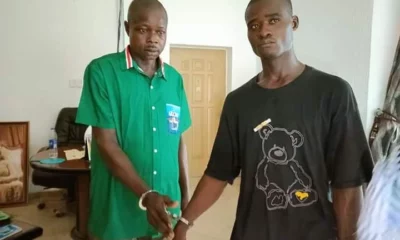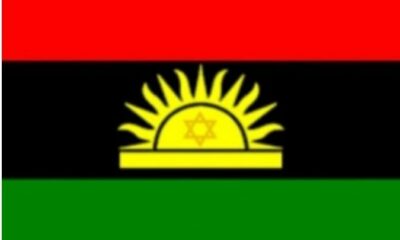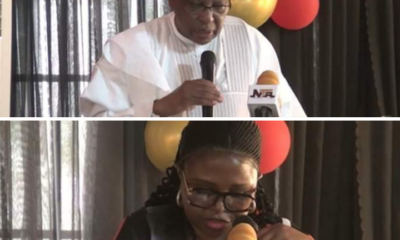News
IPC trains online journalists, bloggers; urges them to help checkmate hate speech and conflicts


By: Ikenna Oluka
The International Press Centre (IPC) has trained thirty-five (35) online journalists and bloggers on Sensitive Conflicting Reporting, as part of the EU-Support to Democratic Governance in Nigeria (EU-SDGN) project.
Explaining the objectives of the Workshop held on September 20 and 21, 2018, in Abuja, the Director of IPC, Mr. Lanre Arogundade, said that with the 2019 general elections approaching, it became necessary to inundate participants on the rules of engagement with regards to elections reporting and conflicts therein.
The Director who was represented by Stella Nwofia, programme coordinator at IPC, referred participants, drawn mainly from North-East, North-Central, South-East and South-South regions of Nigeria, to section four (4) of the Nigerian Media Code of Election Report (revised edition 2018) where ‘Hate Speech’ was singled out as a menace in online reporting and elections conflicts.
He identified the training as necessary because the online environment now occupies a very central place in the media.
According to the Executive Director (ED), online media has become the converging point for all the traditional and conventional media such as radio, television and the Print.
Mr. Arogundade, said, although Nigeria has a large population of internet users, and as a result there is a rapid increase in the number of journalists offering to practise online to reach this ‘Internet or online population’, however, the activities of the practitioners should help checkmate the menace of hate speech and conflicts in the country.


Stella Nwofia, programme coordinator at IPC
“What all this means is that we simply cannot ignore what goes on Online in the name of journalism especially against the background of growing perception that online media and social media platforms are the major harbingers of hate speech and stokers of inciting flames”, the Director said.
He continued: “In general, it is feared that in the realm of politics, violent conflict during elections could occur if online journalism practitioners and bloggers refuse to embrace conflict sensitive principles. The emerging consensus therefore is that online journalists and bloggers need to strive to do better so they could be part of efforts that seek to remove hate narratives from political communication as a way of making the electoral environment healthier.
“In the above regard, it is expected that this training will help participants to understand and imbibe the principles of fairness, diversity and objectivity in reporting the electoral process and the elections”.
He said that the Centre expects the online media practitioners to use their platforms for fair, balanced report, language sensitive and conflict sensitive reporting of the elections.
In her presentation on ‘Understanding Conflict, its Nature and Character’, Dr. Ruqayyah Yusuf Aliyu of the Department of Information and Media Studies, Bayero University, Kano State, described conflicts as a natural and inevitable occurrence orchestrated by perceived threats while mutual respects is the antidote.
Dr. Ruqayyah Aliyu classified conflicts into seven; namely: intrapersonal, inter-personal, Intra-group, party factions, Inter-group, intra-society and international conflicts.


Dr. Ruqayyah Yusuf Aliyu of the Department of Information and Media Studies, Bayero University, Kano State,
On hate speech and fake news, she urged online media practitioners to be abreast of the cardinals of journalism to guide against escalating the scourge which is capable of causing breakdown of law and order in the entire country.
She cautioned the practitioners from sourcing news from social media, especially without verifiable sources.
According to the Facilitator, identified embellished news reports with tribal, ethnic and religious undertone are purveyors of conflicts in the Nigerian setting.
Similarly, the Executive Director, CITAD, Kano, Dr. Y.Z. Ya’u, facilitated discussions on ‘Contemporary Conflicts in Nigeria and Possible Impact on Media Coverage of 2019 General Elections’, urging all stakeholders to work harmoniously towards conflict-minimised 2019 general elections.
“Online journalists in particular must not fail to uphold peace through reporting, especially those that fuel conflicts like Boko Haram, Political-thugs, IPOB, etc.
“You are required to be very careful about certain colourations which tend to depict individuals in the form of Hate Speech. For instance, some individuals are reported in the media as sympathisers of Boko Haram, IPOB, Militants, etc.


Executive Director, CITAD, Kano, Dr. Y.Z. Ya’u,
“It is important to understand the root or what the conflict is all about before reporting to avoid inflammatory reportage.
He however, warned that the fear of fake News should not incapacitate journalists from carrying out their duties effectively.
“The answer to it is investigative journalism as today fake organisations are issuing press releases to incite people against others”, the ED of CITAD, Kano, said.
Leading a session on ‘Social Media & Elections: Giving Practical Effect to Conflict Sensitive Reporting Online’, the Editor-In-Chief, Premium Times, Abuja, Mr. Musikilu Mojeed, advocated for fair and balanced news reporting by the practitioners.
He also cautioned against hate speech and conflict-inducing headlines. “Therefore, the need to be cautious has risen, especially when we cast headlines; as conflict can be triggered by ambiguity in communication intended by the journalist involved.
Mr Mojeed, added: “Thus, when issues arise in the society, journalists can provide parties with the information that convoke wise decisions in managing and resolving conflicts. Always remember that your ‘business’ thrives only when Nigeria is peaceful,”


Editor-In-Chief, Premium Times, Abuja, Mr. Musikilu Mojeed,
He went further to enumerate how online journalists can make a difference in the profession.
The Editor-in-Chief of Premium Times, further urged the participants to “Be proactive and careful with translation (intended meaning or language) and be explicit about reporting constraints. Also, interview people affected by conflict and don’t use offensive, graphic images, videos, etc.


Group photograph
News
“80% Of Buildings In Lekki Have No Approval” – Lagos State Commissioner For Physical Planning & Urban Development Reveals


The Lagos State Commissioner for Physical Planning and Urban Development, Dr Oluyinka Olumide, has stated that 80 per cent of buildings in Ibeju Lekki have no approval.
Olumide disclosed this while speaking to newsmen recently.
In his words; “Just last week Thursday and Friday, myself and the team were in the Ibeju Lekki and Epe axis and you would agree with me that anybody passing through that corridor would see a lot of estates marked. We went there, and I can tell you that from what we saw, over 80 per cent of them do not have approval.
The procedure to get approval is first to get the planning information, as to what those areas have been zoned for. In this case, what we have is agricultural land, and people now go to their families to buy agricultural land. Of course, those lands would be sold because those families do not know the use such land would be put to.
The next thing to do is the fence permit. If you missed the earlier information on not knowing the area zoning, at the point of getting the fence permit, you would be able to detect what the area is zoned for. After that, the layout permits a large expense of land follows.”’
Olumide noted that a layout permit cannot be obtained if it is not zoned for the purpose it was designed for or for the purpose it was being requested.
“So, you can see all these layers, but people still go ahead to start advertising. Some have even gone to the extent of displaying the sizes they want to sell. Imagine someone in the diaspora who wants to send money without any knowledge. Then, no approval is eventually gotten. Even if they pass the assignment and the survey to them, we would not grant the individual permit, because that area is not zoned for that purpose’’ Olumide said
This partly explains why some of the houses are being turn down currently in the state.
News
Lady Dies After Friends Pushed Her Into Boiling Pot Of Fresh Pepper In Delta State


A Nigerian man identified as Israel Joe, has revealed how his friend, Roseline, died after she was pushed into a boiling pot of fresh pepper and tomatoes by her two female friends in Sapele, Delta State.
Joe stated that Roseline, a caterer, went on a trip with her friends to Sapele for a catering job where the bitter ordeal occured.
She tragically passed away on Saturday, April 13 after spending two weeks at the hospital in a very horrible state.
In a Facebook post on Friday, Joe said that before her untimely death, Roseline confided in him about two of her friends who were treating her coldly.
And he has vowed to bring them to justice.






This is such a heartbreaking event.
News
IPOB Declares May 30th As Sit-at-home Day Across The Southern East States To Honour Biafran Fallen Heroes


The Indigenous People of Biafra has declared May 30, 2024, as a sit-at-home day across the South-East to celebrate Biafran soldiers.
The pro-Biafran group said that day is set aside annually to celebrate the men and women who died in the Biafran war between 1967 and 1970 and beyond and even until now.
This was made known in a press statement by the group’s spokesman, Emma Powerful, on Thursday, adding that every Biafran in the South-East is expected to sit at home and reflect on the war.
He cautioned South-East residents to avoid loitering about on this day, adding that those who intend to travel to and fro Biafra land must do so before the evening of May 29.
The IPOB statement also directed that all the residents of “Biafra Land” are to stay indoors from 6 am to 6 pm on May 30, 2024.
He also called on christians and traditionalists to pray to Chukwu okike abiama for the fallen heroes, And also for the independence of Biafra from Nigeria.
-



 News5 days ago
News5 days agoAnambra State Government Arrests Man For Marrying Off His Underage Daughter
-



 News15 hours ago
News15 hours ago“80% Of Buildings In Lekki Have No Approval” – Lagos State Commissioner For Physical Planning & Urban Development Reveals
-



 News4 days ago
News4 days agoIPOB Declares May 30th As Sit-at-home Day Across The Southern East States To Honour Biafran Fallen Heroes
-



 Education3 days ago
Education3 days agoFederal Government Sets To Commence School-To-Work Scheme
-



 News3 days ago
News3 days agoLady Dies After Friends Pushed Her Into Boiling Pot Of Fresh Pepper In Delta State
-



 Finance2 days ago
Finance2 days agoEFCC Chairman Tasks Nigerian Youths Against Crimes And Fraudulent Acts
-



 Entertainment16 hours ago
Entertainment16 hours agoCelebrities Turn Up For The Dedication Of Ali Baba’s Triplets In Lagos
-



 TechNews12 hours ago
TechNews12 hours agoSIM Boxing, And The Unboxing of a Crime Syndicate







